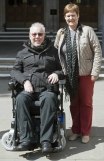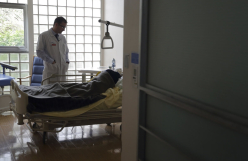Protections surrounding assisted suicide are too weak, a leading Christian bioethics institute has warned.
According to analysis from the Anscombe Bioethics Centre, evidence shows that precautions initially put in place by governments that have legalised assisted suicide are frequently weakened or removed.
"The seriousness with which safeguards are taken declines year on year," the author of the report, Professor David Jones, told Christian Today.
"The problems don't stop when you change the law. That is the start."
The report collated evidence from four jurisdictions where assisted suicide has been legalised; Oregon, the Netherlands, Switzerland and Belgium.
In each jurisdiction, the number of accepted assisted suicide cases has increased over time. Additionally, the common pattern shows a shift from permitting assisted suicide for cancer victims, to extending legislation to incorporate other diseases, including many that are non-terminal.
Of particular concern is the evidence about safeguards in Oregon, said Professor Jones, as this is held up as the model for England and Wales to follow.
Only 5.5 per cent of patients requesting assisted suicide in Oregon were referred for psychiatric evaluation; one of the cornerstone safeguards when the legislation was first introduced in 1997.
According to the evidence, the fear of being "a burden on family, friends / caregivers" is more often cited by people requesting assisted suicide in Oregon than "inadequate pain control."
CARE (Christian Action Research Education) has been lobbying against a change in law regarding assisted suicide for many years. Spokesman James Mildred said the implications of the report's findings show that such a change would be "disastrous".
"This detailed and comprehensive report emphasises what we have been warning from the beginning – that once you open the door to assisted suicide, it gets pushed wider and wider," he told Christian Today.
"On the basis of this report, liberalising the current law on assisted suicide would have disastrous consequences for vulnerable people."
Campaign group Dignity in Dying (DiD) denied that safeguards were weakening and said the current law is broken.
"The Assisted Dying Bill is based on the law in Oregon, which has been working safely since 1997 and where there has been no extension beyond the criteria of terminal illness," Sam Dick, DiD's director of campaigns and communications, told Christian Today in an emailed statement.
"The House of Commons now has an opportunity to give dying people choice at the end of life while also best protecting vulnerable people."
However, a group of doctors today warned that allowing terminally ill people to take their own lives would "devalue the most vulnerable" in society.
"We regularly come across patients who feel a burden to their relatives and to society due to their particular health and social care needs," read a letter to the Daily Telegraph signed by nearly 80 doctors.
"They are under pressure from within to remove themselves as a burden on their hard-pressed families. With an ageing population and with many families today unable to devote themselves to full-time care of a seriously-ill relative, situations like this are not uncommon."
A bill to legalise assisted suicide in the UK will be debated in Parliament on 11 September.

















